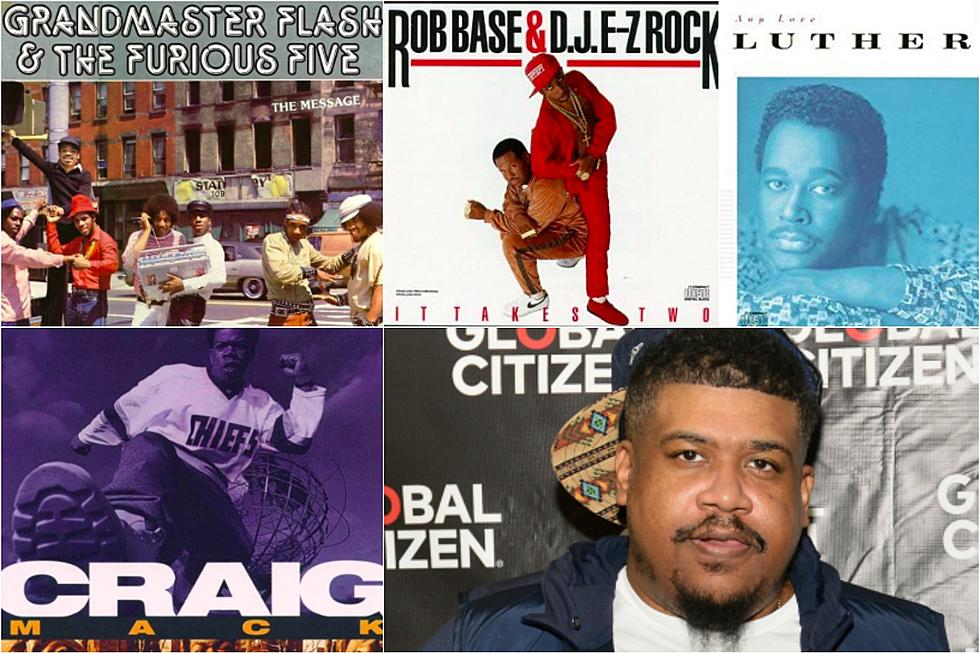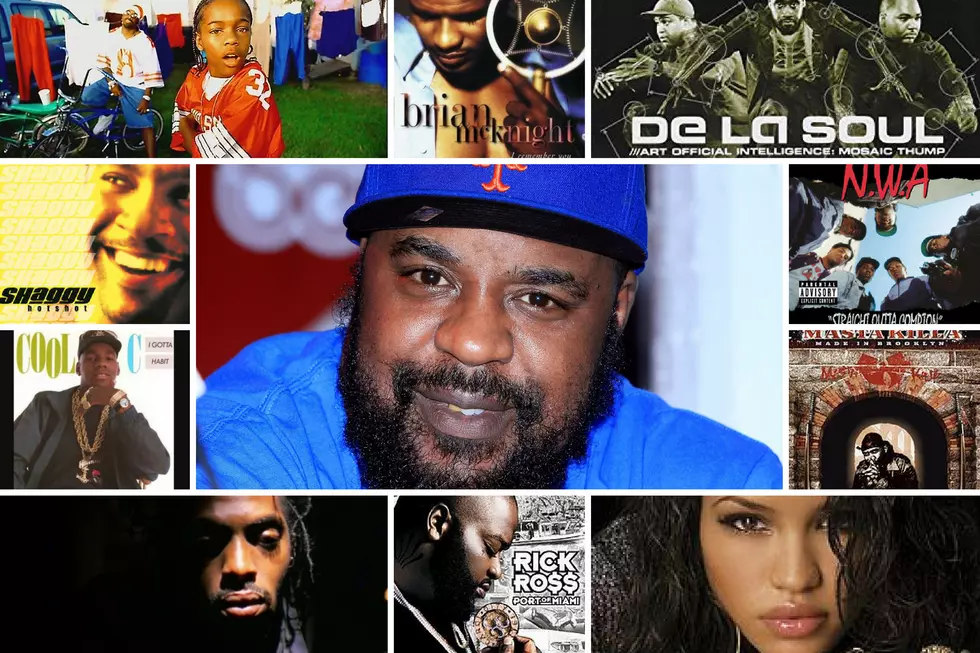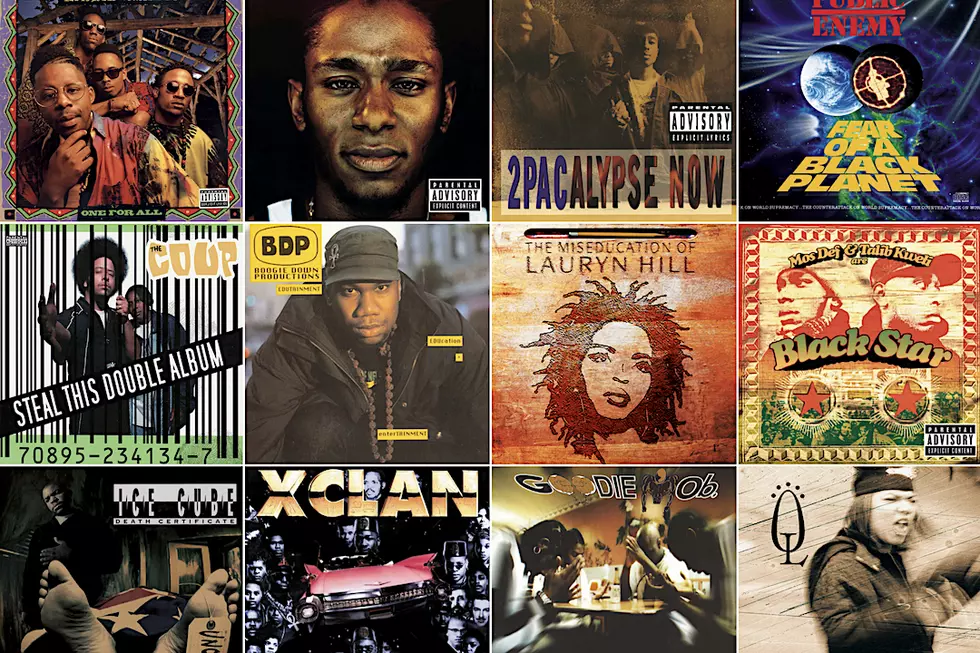
How De La Soul Reincarnated Themselves With ‘De La Soul Is Dead’
In 1989, De La Soul introduced themselves with their excellent debut album, 3 Feet High and Rising, which helped flip the sound of hip-hop upside down with its quirky subject-matter and innovative production qualities.
Two years later, they turned the whole apple cart upside down again with De La Soul is Dead.
The Long Island, N.Y. trio -- comprised of Posdnuos (aka Kelvin Mercer), Trugoy (aka David Jolicoeur) and DJ/producer Maseo (aka Vincent Mason Jr.) -- quickly beaome wildly popular among listeners who gravitated to their light-hearted tales of the every-man and their comedic tendencies, conveyed both through rhyme and via their odd-ball skits, the latter of which the group is credited as introducing to the world of hip-hop.
3 Feet High and Rising was one of the first rap albums to be warmly embraced by mainstream critics, with lauded journalist Robert Christgau writing, "An inevitable development in the class history of rap, [De La Soul is] new wave to Public Enemy's punk," in his Village Voice review of 3 Feet High and Rising.
Their music is maddeningly disjunct and a few of the 24 tracks are self-indulgent. But their music is also radically unlike any rap you or anybody else has ever heard. The album was also compared to historic opuses by rock icons Pink Floyd (Dark Side of the Moon) and the Beatles (Sgt. Peppers). 3 Feet High was also added to the Library of Congress' 2010 National Recording Registry in light of its cultural influence and importance.
Toss in game-changing singles like "Me Myself and I," "Potholes in My Lawn," "Buddy," and "The Magic Number," the group's debut effort is without reproach in terms of it being a groundbreaking rap album and the most important project in De La Soul's discography. But alas, those glowing accolades aside, it is not the group's best work to date. That distinction is reserved for De La Soul's sophomore album, De La Soul Is Dead, which served as a departure from the aesthetic and sentiments of the very album that immortalized the group as one of the most innovative acts in music history and vanguards of alternative rap.
The success of 3 Feet High and Rising may have afforded De La Soul acclaim, but it also stigmatized the group, boxing them into being regarded as "hippies" by fans and journalists, which put them at odds with hip-hop's transition to the more street-wise rhetoric of Public Enemy, Big Daddy, N.W.A, and a slew of other acts that were all the rage during De La's rise to prominence.
The same vibe which garnered them praise from the media and the avant-garde set of rap enthusiasts brought them perceived slights from certain members of the hip-hop community, with some pegging the group as soft and corny, attributes that didn't jive well with De La. One of the more infamous examples of this was De La Soul's appearance on The Arsenio Hall Show, during which they were introduced by Arsenio as "the hippies of hip-hop," despite explicitly stating they were not on their hit record, "Me Myself and I." Their experience on late-night TV apparently left a sour taste in their mouth and would be a motivating factor in the making of De La Soul Is Dead, which saw the group effectively signaling the end of the D.A.I.S.Y. age (otherwise known as Da Inner Sound, Y'all).
Featuring production exclusively by Prince Paul, the mastermind behind the beats found on 3 Feet High and Rising, De La Soul Is Dead picks up where their debut album left off, but mines its predecessors more redeeming qualities, all the while flipping the script and reinventing themselves and their image.
The skits that made 3 Feet High and Rising such a departure from the norm are present on De La Soul Is Dead in the form of a storyline featuring a crew of hardrocks who jack a hapless kid for his De La Soul tape and provide mixed-reactions to the music in between the tracks.
While the opening skit may have followed the blueprint of 3 Feet High and Rising, as soon as the groovy bassline on "Oodles of O's" rings through, its clear that whereas 3 Feet High and Rising was cheery and hip, De La Soul Is Dead veers more towards the realms of steely and slick. Dove take the initiative and lays the first rhymes heard on the album, opening with, "Oodles and oodles of O's, you know / You get 'em from my sister / You get 'em from my bro / All I is is man, and once an embryo / Am I solid gold? I don't cast a glow," as he gets into the groove of his verse.
Posdnuos then makes his first appearance on the song's second verse, spitting "Last of the fast Plug pipers at the do / In your eyes burning like rubbing alcohol / Native is the Tongue that speaks the Giacomo / Kinfolk will play this in stere-ereo," bringing the album in on a funky, high-note.
In addition to skits, masterfully-placed intermissions like "Talkin Bout Hey Love" also give De La Soul an added level of cohesiveness and strings the album along with a nostalgic air that brings to the mind the good ol' days, when times were simpler. But the first true highlight of De La Soul Is Dead is the song, "A Roller Skating Jam Named Saturday," which features fellow Native Tongues member Q-Tip.
On the track, Tip turns in a steady stanza, musing "Girl meets boy on Thursday night / Boy was high, girl fly like kite / They hold hands until next day/Boy then lets go, hit his way." Pos then drops some lines of his own, ordering, "Yo, slip your butt to the fix of this mix/Toss that briefcase, it's time to let loose / Cause you've worked like heck to get the week in check / So unfasten that noose around your neck," before vocalist Vinia comes in with the feel-good hook.
Social commentary is also present on De La Soul Is Dead, with "My Brothers A Basehead" serving as one of the songs that touches on the ills of the inner-city, sans the heavy-handed preaching. Dance fanatics get tossed a bone with "Let, Let Me In," which totes a bassline similar to the one some may recall from Cypress Hill's 1991 single, "Just Kill A Man."
The hardest track on De La Soul then arrives in the form of "Afro Connections at a Hi 5 (In the Eyes of the Hoodlum)" one of two full-length songs included on the CD version of the album that sees Pos and Dove sending shots at gangster rappers before commandeering the drum-laden soundbed and spouting off heady flows. However, the pinnacle of De La's sophomore set is "Millie Pulled a Pistol on Santa," an inventive tale of a hottie named Millie that's being sexually abused by her father, Dill, who also happens to be a social worker and a respected figure in the community, and stands as the most riveting, yet sobering moment on De La Soul Is Dead.
Other selections on De La Soul Is Dead that rate high are "Kicked Out the House," which allows producer Prince Paul to shine with his precocious knack for turning a hodgepodge of samples into a quilt of melody, and "Pass the Plugs," which wins with its meaty drums, and includes the line "Aresnio dissed us, but the crowd kept clapping," all but confirming that the moment made an impression on the group.
Rounding itself out with addictive numbers like "Ring Ring Ring (Ha Ha Hey)," and "Keepin' the Faith," De La Soul completes its musical journey, which ends with the bandits doubling as narrators dissatisfied with the stylings of De La Soul Is Dead and its lack of violent overtones, misogynistic views and other calling cards of gangsta rap.
De La Soul Is Dead would fail to duplicate the commercial success of 3 Feet High and Rising, but is their most focused release and embodies the group's characteristics and ethos to a tee. Injecting cautionary tales, funky soundscapes and random oddities, their sophomore effort sees the legendary group holding court from the vantage point of the same terrain of the gangster rappers and fly guys, albeit on their own stoop and watching from afar with a keen, yet cautious set of eyes.
And 25 years later, De La Soul's vision is still one to behold and appreciate, as it makes for one of the greatest albums in the history of hip-hop and music as a whole.
More From TheBoombox









